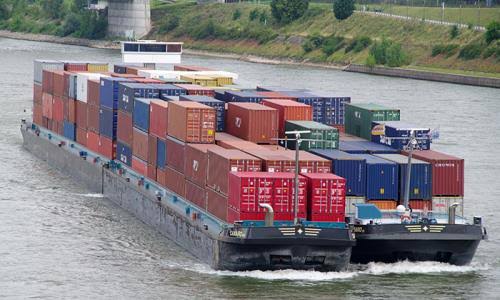By Joshua Yousouph
Barge operators in Nigeria have lamented the drastic economic downturn in barging activities. This is even as some have reportedly started selling off their barges due to lack of patronage.
Recall that in 2020, barging was introduced as a key component of cargo evacuation at Nigerian ports and terminals, due to congestion that was being experienced, particularly in the ports in Lagos.
However, since it was introduced, barging has significantly reduced the congestion at our ports and terminals by reducing the dwell time of cargo as more cargo are moved out of the ports to their final destination.
Our correspondent observed that following the drop in importation into Nigeria, there are fewer activities of moving containerized cargo from port terminals by barges. Findings by Shipping Position Daily have also revealed that some of these barges are being currently put up for sale as advertised in some media platforms.
Speaking with the Public Relations Officer of the Barge Operators Association of Nigeria (BOAN), Mr Daniel Eze, he lamented that every business in Nigeria particularly barge operations has been affected by the global changes and challenges. He noted that the drop in importation has sent some of the barge operators out of business.
Eze also informed that asides barge operators, owners of trucks and articulated vehicles are also putting up their trucks for sale due to lack of jobs at the terminals caused by a drop in importation. He however stressed that he is optimistic that soon, normalcy will be restored and activities will pick up at the ports.
“There are always ups and downs; challenges come and of course we are to surmount those challenges. When the GSM license came out, a lot of people came into the GSM business in Nigeria. Along the line, it’s not all of them who registered as GSM operators that are still operating in Nigeria. So the same thing applies to barge operations. Of course that does not mean that the business is going down”, he said.
He confirmed that, “people are saying there is no barge business in Lagos, so they are selling their barges; thinking that the barge business will no longer be sustainable here in Lagos. It is not true, I refuse to agree or submit to that submission because as long as there is water in Lagos, it is one of the means of transportation”.
“Are you telling me that the people who invested in aviation are not making profit in the business, because of people using the roads or the cost of running their business? It is because they are not getting enough passengers like when they came into the business, because of the current situation of the economy.
Explaining further, he said: “Globally, every business has been affected by the global changes and challenges and so it will come back when the economy bounces back. This is because it is the amount of container that comes into Nigeria and the volume of the export that will determine the portion that will come to barge operation and also Land. It is just how it operates.
“Even those in the truck business will tell you that they are not having as many jobs as they used to have. I know of a lot of people who are equally selling their trucks. Does it mean there are no new people coming into the trucking business and there are no people still in the trucking business? So going by that, I believe the business will kick off one day” he concluded.
Also, in a chat with the immediate past President of Shippers Association of Lagos State (SALS) Rev. Jonathan Nicole, he noted that barge operators pay heavily to terminal operators for berthing their barges at the terminal awaiting container trans-load.
He stressed that operating and maintaining barges is capital intensive, hence lack of jobs will render the barges as liabilities incurring debts for barge operators’ overtime. He also added that some of the barges were gotten by loans which must be paid back.
Nicole informed that all barge operators are experiencing a downturn in barging business except those who have permanent contracts with the shipping lines to move containers to their off-dock terminals.
He said: “If there is a drop in evacuation of goods through barges, no barge owner will want to keep a barge at the shoreside without jobs. I believe they pay a certain fee for keeping their barges by the side of the terminal. Terminal operators might even charge them for keeping their barges there. When they look at the total bills they pay and their income, if they don’t accommodate their comfort, there is no point in doing such business. It is not profitable and you know barges are very expensive to run and maintain. You have to get enough jobs to keep it afloat.
“There is drop in importation because the exchange rate is abnormal. Even if you struggle to get funds from the black market at an abnormal rate, by the time you come back it will have gone up. So you have to source for additional funds to be able to cope which will lead to additional costs in goods. Some of them who got loans have to pay back.
“Those are some of the reasons they are experiencing a downturn in barging business, except those who have permanent jobs with the Shipping lines to move containers to their off-dock terminals. But without that, it is going to be very difficult to survive in barge operations” Nicole concluded.
On her part, another barge operator, Hajia Bola Muse confirmed that the business of barge operation is drastically going down in Nigeria. She blamed this on the prevalent global economic challenges and low importation in the country.
Responding to the sales of barges by operators, Bola Muse noted that she is not aware that some of her members are selling their barges. She however called on the government to overhaul the maritime Industry, adding that she is hopeful that things will become better in the industry through the newly elected government.
“Globally, everything is at a standstill because of the economic challenges happening around the world. This is not only applicable to Nigeria. There is no patronage of importation and it is going to affect the barges too. I am not aware that some of our members are selling their barges. I wouldn’t know that as it is currently not in my knowledge. Be that as it may, we are still working and God has been favourable to us.
“The government should overhaul the maritime industry. It is not only the barge sector that is facing these challenges. It is all over the maritime industry. We believe that with the coming of the new government, things will become better in the industry”, she said.
Also speaking, the Western Zone General Secretary of the National Association of Government Approved Freight Forwarders (NAGAFF), Stanley Ezenga noted that the currently low importation and business turnout for barge operations in the country is normal, adding that it is not yet its peak period.
Ezenga stated that business activities are usually slow between January and April due to importers’ apprehension and uncertainties regarding economic trends and government policies. He however advised barge operators to endure the current challenges as there will be light at the end of the tunnel.
“Importation in Nigeria has two phases. We have the peak period which is July to December. But when it comes to January till March or April, business activities are always slow, the reason being that importers do wait for the budget to be read, so that they will know which way the economy is going, what they will import and what they will not import. Every year, there are policies on products that can come in and those that cannot come in. So most times the importers don’t rush to import. They have to wait.
“If the barge operators are experiencing low business turnout, it is normal at this time. They are all in the business to make a profit, but if they can tarry and wait, the tide will change. More especially this is an election year and we don’t know what will come with it. Most importers are very sceptical and still holding on to their cash” Ezenga concluded.
shippingposition
Kindly like us on Facebook/twitter















